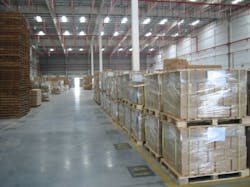Indeed, controlling energy costs is in many ways part of the energy security issue as more stable supply tend to even out the price one pays for power – be such power come from petroleum, natural gas, wind farms, whatever.
From that perspective, then, think on some of the findings from consulting firm Ernst & Young’s Global Annual Cleantech Insights and Trends report. This survey of 100 global company executives operating within what the global consulting firm dubs “energy intensive sectors” found that 38% of respondents expect energy costs to rise by 15% or more in the next five years.
Furthermore, half said they their energy expenditures represent 5% or more of operating costs, while a significant subset (22%) reported that 20% or more of operating costs go to energy. In absolute terms, this translates into an annual energy spend of at least $50 million for 42% of respondents, and more than $100 million for 27% of respondents, stressed Gil Forer, Ernst & Young's global cleantech leader.
“While cost reduction is now cited most frequently as the primary objective of corporate energy strategies, a number of other energy-related risks are also being addressed, such as energy security, carbon reduction and price stability,” he added. “Regulatory compliance, together with reputational and brand aspects, also plays a part."
Energy supply is such an important issue nowadays that for more than a third of companies (36%) in the consulting firm’s survey said that the CEO is now the final decision maker on energy mix strategy. “That illustrates how important the issue is already regarded today,” stressed Forer (seen at left)."As a result, energy efficiency measures, company self-generation of energy and integration of renewable energy into the corporate energy mix are all being implemented at increasing rates to meet these ends and are set to accelerate further over the next five years,” he pointed out.
Take a look at Ernst & Young’s findings when it comes to the use of renewable energy from two perspectives: energy generated by company-owned or controlled assets and energy purchased from outside parties.
Whether solar, wind, bio-energy or other kinds of renewable energy generation, 41% of respondents to the firm’s survey said they generating some form of renewable energy with company-owned or controlled resources; however, this represented a relatively small proportion of total company generation.
In contrast, nearly half of respondents (48%) reported deriving some proportion of their purchased energy from renewable sources, with a fifth of companies reporting a contribution in excess of 20%.
“Pricing remains a key factor in the adoption of renewable energy [as] 43% of respondents said that they would be unwilling to pay a premium for renewable; highlighting the importance of achieving grid parity and developing innovative project-financing models,” noted Ben Warren, Ernst & Young's energy and environmental finance group leader.He added that, looking forward, 67% and 59% of respondents reported that their company-owned renewable generation and renewable purchased energy levels are likely to increase over the next five years respectively.
At the same time, 52% of respondents say that their use of high-carbon fossil fuels – such as oil and coal – will decrease over the next five years, said Warren (seen above).
“From either perspective, this suggests that new companies will explore renewable generation and purchased renewable energy, and those already involved plan to invest further,” he pointed out.
More importantly, Warren declared that “many well-known global companies” in his words have already launched initiatives to generate their own energy for a variety of reasons, including reducing energy price volatility, increasing security of supply, decreasing costs and meeting carbon objectives.
However, half (51%) of respondents reported no self-generation at present, with the main barriers to uptake relating to the significant payback period on investments, followed by risk considerations and internal rate of return calculations.
"Despite half the companies surveyed not currently having self-generation, it is important to note that 44% also believe that the levels of self-generation will increase over the next five years,” Forer noted. “The main obstacles noted in the survey suggest that the right financial models could unlock corporate investments in energy generation."
So, why the hubbub over “self-generation” and “renewable” energy sources? Very simple: some 92% of the respondents to Ernt & Young’s survey pointed to energy cost reductions as the primary objective of their energy efficiency initiatives, with 47% saying that energy demand management is one of the most important energy efficiency strategy elements.A large number of respondents also anticipate increasing energy efficiency over the next five years, according to Forer – with 60% expecting increased energy savings, and another 22% expecting significantly increased energy savings.
Now, many of the firms in Ernst & Young’s survey cite efforts to control energy consumption in what many would think are “non-trucking” areas such as building energy management systems (20%), energy-efficient lighting (18%) and building automation (18%).
Yet don’t forget the trucking industry isn’t just about tractors and trailers; it also encompasses warehouses, maintenance shops, and dispatch offices, just to name a few. It’s also becoming technology-reliant, too, with computers, servers, and other information systems sucking up energy along with light bulbs, air condition, and heating systems.
Truth is, energy consumption encompasses a wide range of operations within trucking, and all of them are subject to ever-more volatile market conditions. So don’t be surprised if how to control and secure electricity supply becomes a topic of operational interest down the road, for all forms of energy – oil, coal, natural gas, you name it – are experiencing all sorts of pricing and supply swings these days.







